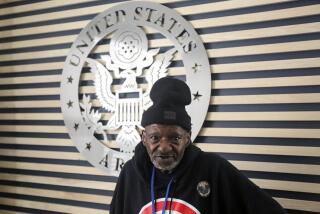Hepatitis C in Spotlight at Veterans Event
- Share via
To many veterans, the cascade of postwar scourges has a biblical quality: post-traumatic stress disorder. Agent Orange. Birth defects. Gulf War syndrome.
Now there is hepatitis C. The chronic liver ailment turns up in former service personnel who use VA facilities--especially Vietnam-era vets--at a rate four times the national average, medical experts say.
Although the prevalence of the disease among veterans is little known outside that community, it was clearly on the minds of those attending this year’s Vietnam Veterans of America convention, which concludes today in Anaheim. Booths offering the latest therapies and testing devices for hepatitis C were most common, apart from those selling memorabilia, among displays at the Anaheim Marriott.
One company gave out more than 200 free home hepatitis C test kits on the first day of the convention. A steady stream of veterans visited the booth to learn about the test, which retails for $70.
Hepatitis C is a progressive disease that can go undetected for up to 30 years and lead to liver cancer, cirrhosis and liver failure. In the past year, the disease has drawn increasing attention from veterans and the hospitals that treat them.
Identified in the 1940s, hepatitis, an inflammation of the liver, is commonly caused by a virus. Scientists had developed tests for hepatitis A and B viruses by the early 1970s, and there is a vaccine for both.
Type C, however, remained a mystery, and researchers took almost 20 years to isolate the virus and create a test for it. As a result, people still contracted hepatitis C through 1992 from blood transfusions, though the blood had been screened for other types of hepatitis.
VA experts estimate that a soldier receiving five units of blood in Vietnam had a 6% to 12% chance of getting hepatitis C. No statistics were available for Gulf War veterans.
There is no certain cure for hepatitis C. Even the new antiviral treatments, which take as long as 48 weeks, appear to be successful in only about 40% of cases so far.
“This is a slow, progressive disease that does liver damage,” said Dr. Timothy Morgan, who heads the hepatitis C program at the Long Beach VA Medical Center. “It is important to identify those with the virus because if you drink alcohol, more than two drinks a day . . . the disease will progress faster.”
The Veterans Health Administration last year decided to screen every veteran who comes to its medical facilities for the disease. This year, the agency committed itself to costly antiviral therapy for all veterans who have the illness and would benefit from these state-of-the-art drugs.
“It is a very high-profile commitment from Washington,” said Dr. Teresa Wright, a nationally recognized expert on hepatitis C who is chief of gastroenterology at the San Francisco VA Medical Center.
Especially at risk are those who received transfusions before 1992 and former combat soldiers who were exposed to people wounded on the battlefield. Even by sharing razors or etching crude tattoos, soldiers may have increased their likelihood of getting or transmitting the virus.
Michael Weber, a 101st Airborne Division vet from Miami, believes that he contracted hepatitis C in Vietnam. The 48-year-old veteran learned he had the virus in 1993 during a visit to the VA hospital for Agent Orange screening. Hospitalized four times in the past year for hepatitis-related problems, the ponytailed veteran went into liver failure and a four-day coma and almost died earlier this year.
Weber, whose skin is tinged yellow from jaundice, has been treated for other problems as well. Like many Vietnam-era vets, he feels numbed by a never-ending parade of ailments.
“I will not live out a normal life span,” he said. “I get tired of being diagnosed for something else. Every time I get over one thing, it is another.”
Weber’s case represents one difficulty in hepatitis C antiviral therapy. His clinical depression--which often is associated with chronic illness--makes him ineligible for the interferon-plus-ribavirin treatment, because it could seriously worsen his depression and even lead to suicide.
Rather than dwell on that frustration, he goes on with his life, saying frankly that he expects to die from hepatitis C complications sometime soon. In the meantime, he follows a strict diet, avoids alcohol and stress, and hopes for a liver transplant.
The Centers for Disease Control and Prevention in Atlanta estimates that 4 million Americans--about 1.8% of the population--have hepatitis C, though the vast majority are unaware of it.
Those at increased risk include intravenous drug users, people with multiple sex partners or tattoos, those on hemodialysis and those who share toothbrushes and razors.
The Veterans Health Administration offered a diagnostic test to everyone using a VA medical facility on March 17--about 26,000 vets. Based on these results, officials estimate that 8% to 10% of vets who use VA facilities nationally have the disease.
Nationwide, that means about 350,000 veterans have hepatitis C, said Dr. Toni Mitchell, who heads the hepatitis C program for the Veterans Health Administration. VA medical officials estimate that about 70,000 would qualify for the antiviral therapy, which costs about $18,000 for the full 48-week cycle.
Others--many of whom are less seriously ill or whose health makes them unsuitable for antiviral therapy--would be treated with diet changes, educational programs and counseling.
More to Read
Sign up for Essential California
The most important California stories and recommendations in your inbox every morning.
You may occasionally receive promotional content from the Los Angeles Times.













